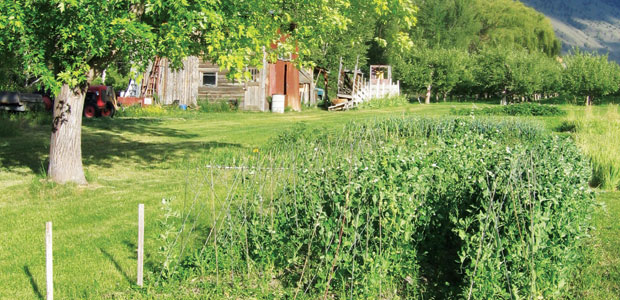Advertisement
Canada’s Organic Capital
It’s early afternoon and I’m squinting down at carefully cultivated earth, trying to decipher which ones are weeds and which ones are fledgling beet leaves. The mid-June sun promises a hot summer and a sunburn if I’m not careful. “There’s no such thing as a weed,” says Doe Gregoire, my gardening companion. “Weeds are merely … Continued

It’s early afternoon and I’m squinting down at carefully cultivated earth, trying to decipher which ones are weeds and which ones are fledgling beet leaves. The mid-June sun promises a hot summer and a sunburn if I’m not careful.
“There’s no such thing as a weed,” says Doe Gregoire, my gardening companion. “Weeds are merely plants in the wrong place.”
What do I know about weeds? I ask myself, a little panicked about yanking out the wrong tiny green growing thing. I’ve weeded only my wardrobe in the past few years. But gradually, in Cawston, BC, the organic capital of Canada, this philosophy begins to make sense. Here on a getaway from Vancouver, I’ve temporarily traded nail polish for a nail scrub brush and I have a ton of questions. What’s it like first-hand to grow certified organic? What makes Cawston special? With the 2010 Winter Olympics coming, is there a chance organics will end up on athletes’ plates?
History of a Hamlet
The Similkameen, where Cawston nestles among wildlife-dotted mountains, is a gem of a valley about 370 km east of Vancouver. The Okanagan Valley, farther east, is more famous for tourists, and many travellers zoom through the straight stretch between Keremeos and Osoyoos without stopping.
Pity, because to either side of Crowsnest Highway 3, an anthill of activity is underway. The area’s strong land-bound history is evident in rolling fenced ranches and vibrant fruit stands. For organic enthusiasts, Cawston is the place to stop. This community (population 845) boasts Canada’s highest concentration of certified organic farms, at 40 percent. One of these is Four Winds Farm, not a regular guesthouse but open for my organic crash course. Soon after I’m settled in, Gregoire shows me around her 3.5-hectare property, most of it dedicated to McIntosh and Spartan apples that are now about the diameter of a toonie.
Regular walk-throughs, Gregoire explains, give her a sense of what’s happening in the orchard. She knows each tree so well, they might as well have names. We examine leaves for possible aphid infestation and around bark soil lines for damage done by tree borers. Dialogue runs to coddling moths and nutrient sprays.
“Education is really important,” she says, “so people realize the effort that goes into organics when they see them on the shelf.”
A Growing Industry
Canada has more than 3,600 certified organic growers, plus another 250 or so in transition, according to the Canadian Organic Growers Association. A Canada Organic logo was introduced in July 2007, and regulations were announced in December 2006 to govern Canada’s $1 billion organic industry.
A label is one thing. Experiencing the lifestyle is another–and one thing is clear to me in Cawston. Two days is barely enough time to scratch the surface of this complicated business.
Inside the house, we’re surrounded by resources on natural pest management and reams of paperwork required for certification. Gregoire shows me her orchard diary, which details every treatment or spray her crops receive, when, and why. This paper trail is so extensive that, if consumers wanted to, they could find out not only which farmer grew a product but exactly how it was grown. For example, in Hawaii last year Gregoire discovered apples with the sticker from Cawston Cold Storage, her local packing house. With a couple of phone calls, she could have determined if they were her own apples.
“We have an infrastructure here that works,” agrees Linda Edwards, president of the Pacific Agriculture Certification Society, a regional certifying body. The three of us sit over homemade strawberry shortcake to discuss what makes Cawston unique. The beautiful climate, for one, says Edwards, but also the people.
“Unlike most agricultural areas,” she says, “we’ve got farmers for the next generation.” This is reassuring, given troubling reports that the number of farms in Canada has dropped 7 percent during the past five years.
Organic Olympics?
Given its passion and reputation, is there any chance of Cawston participating in the Olympic Games, foodwise? There has been local interest, affirms Lee McFadyen of Mariposa Organic Farm, Similkameen’s original organic farm.
“In the 1970s, several young people pioneered the use of organic principles,” she recalls. “Once an established nucleus of people was growing organic successfully, a lot of other people saw an opportunity, got on the bandwagon for their own reasons, and ultimately discovered this was a much better way to farm.”
In the late 1980s, McFadyen designed a course for Okanagan College, where she used to teach. More recently, she organized a seminar for the Similkameen Valley Planning Society about agri-tourism and supplying the Olympics. She also initiated meetings with interested farmers.
Two speakers from the 2010 Commerce Centre came and said the idea was workable, confirms Michael McLaughlin of the Economic Development Office of the Similkameen Valley. A major Olympic caterer also visited the area but, since then, discussions seem to have stalled.
The Vancouver 2010 Sustainability Report 2005-06, released by the Vancouver Organizing Committee (VANOC), lists numerous planned projects for greening the games but does not specifically mention organic food. VANOC media relations didn’t respond to requests for an interview.
Still, it is a possibility. “We’re actively lobbying VANOC to source local and organic food, whether we get any business from it or not. It is the right thing to do,” says Darren Stott, marketing manager of Small Potatoes Urban Delivery in Vancouver (spud.ca). “The 2010 Winter Olympics are an international event expected to be watched by millions. The Games will be a good way to show the world how to help reduce global warming by buying local and organic. Both significantly use less carbon fuel than conventional imported food.”
“Certainly athletes who are stressing and expecting a lot from their bodies should be eating the best foods they can,” McFadyen adds of health considerations. “Their bodies shouldn’t have to deal with the possibility of ingesting agro-toxin residues, and then either storing them or excreting them.”
Among growing research suggesting organic foods contain higher nutrient levels, the Journal of Agricultural and Food Chemistry reported on June 23, 2007, that organic tomatoes have almost double the level of flavonoids than conventional tomatoes. Antioxidant flavonoids reduce high blood pressure and the risk of heart disease and stroke.
Life on the Farm
Meanwhile, back in Cawston, day-to-day tasks never slow. Gregoire and I harvest crops of lavender, oregano, and French tarragon, some to be sold at a farmers’ market. We begin the arduous task of pruning the tops of echinacea plants so new ones can grow. A chartered herbalist, Gregoire also runs a home-based medicinal herb business.
“For me,” she says, “making a living on a farm is a chosen lifestyle–a wholesome, healthy, spiritual way of living as well as providing food for the masses.”
“Farming is a wonderful occupation,” agrees McFadyen. “By practising organic principles, I’m not contributing to the accumulation of agro-toxins in the environment.” Eighty of McFadyen’s 100 hectares are preserved as an ecological reserve to help maintain biodiversity as part of her involvement with The Land Conservancy of BC (conservancy.bc.ca), a project close to her heart.
All too soon, I’m back on the road to Vancouver. The knees of my pants are dirty from weeding and my head’s swollen with facts. Even though an Olympic connection remains unconfirmed, going certified in Cawston, Canada’s organic capital, was an experience worth repeating.





